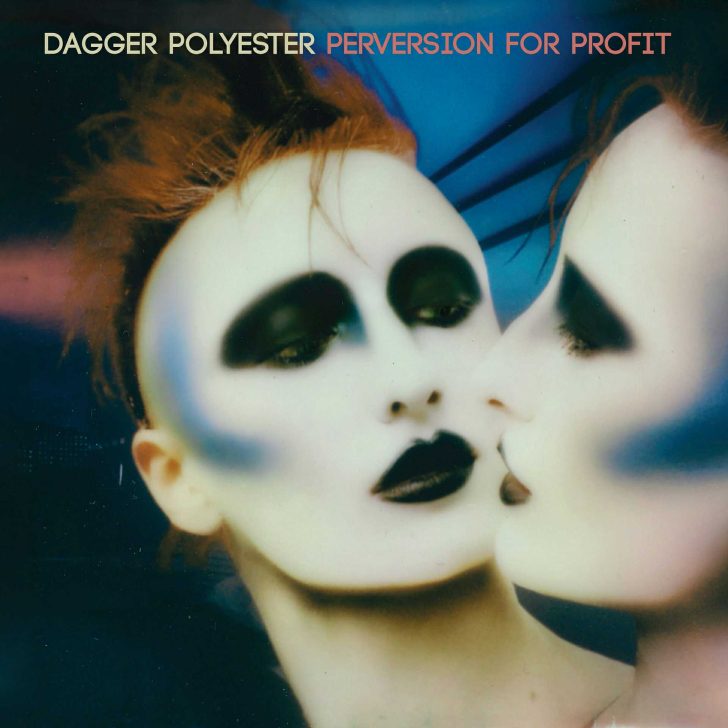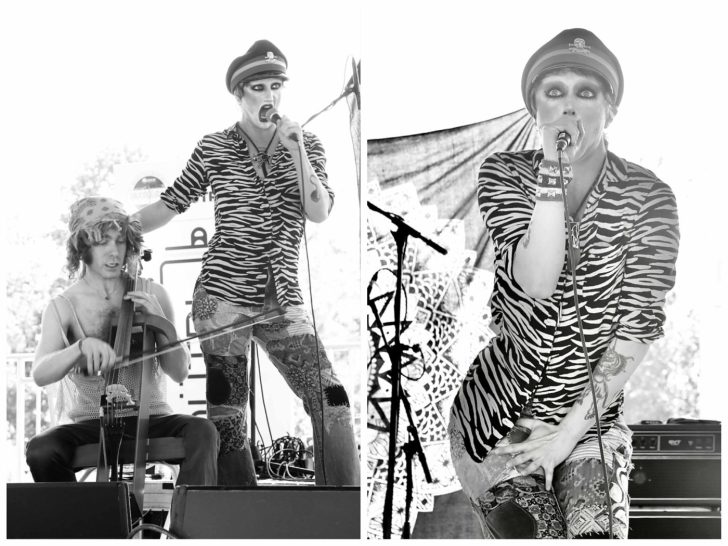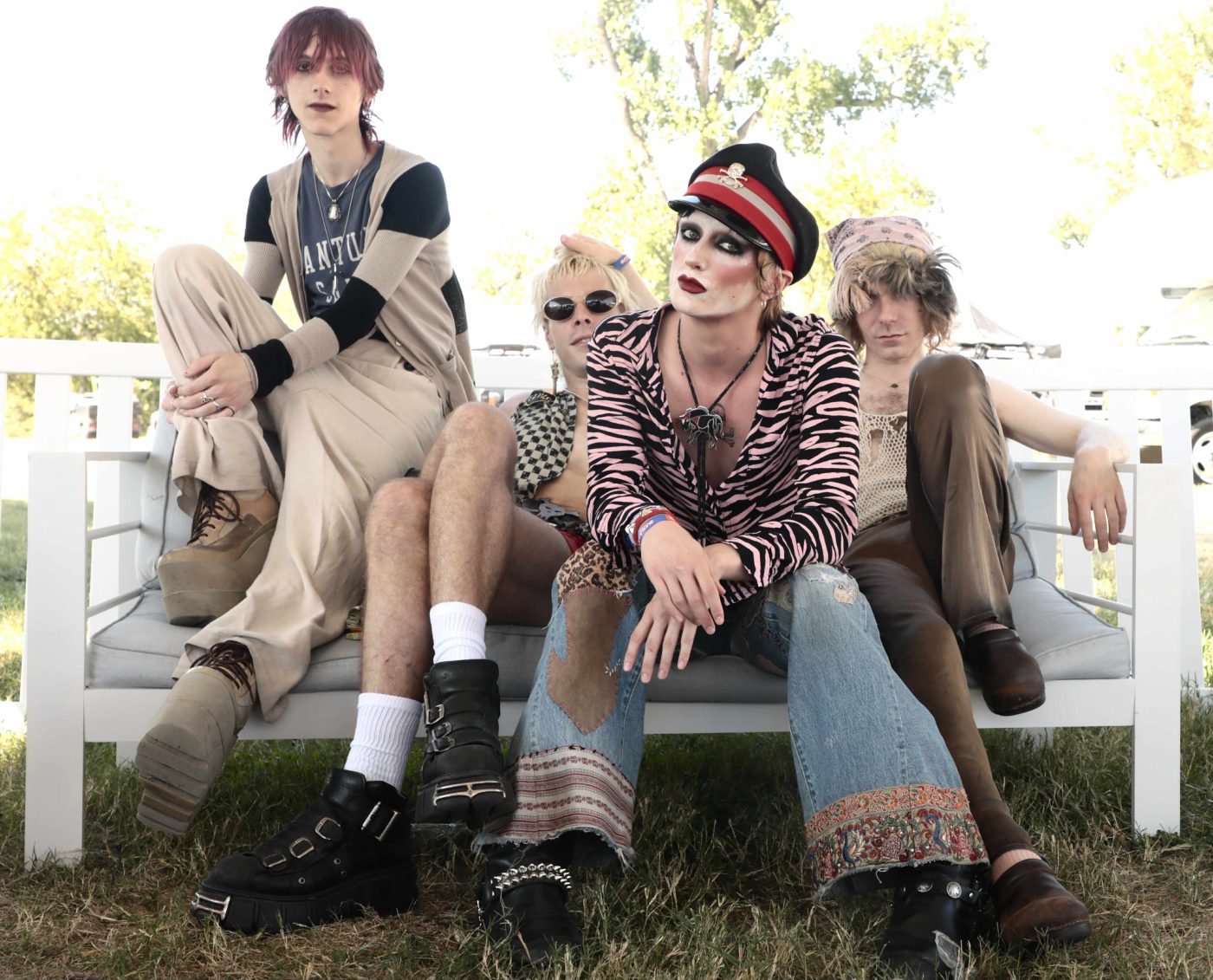Dagger Polyester may still be flying under the radar, but the LGBTQI+ community—and the wider music world—won’t be sleeping on him for much longer. His debut album, Perversion for Profit, dropped in early August 2025 and is already stirring conversation with its provocative concept and daring sonic vision.

Taking inspiration from the tragic murder of actress Lana Clarkson and the infamous 1963 propaganda film Perversion for Profit—which linked explicit media to moral decay and homosexuality—Polyester transforms dated hysteria into a sharp critique of contemporary queer commodification and cultural control. The album’s title came to him after spotting a protest sign referencing the film in a documentary, sparking a fascination with the intersections of queerness, censorship, and fascism.

Dagger Polyester. Photo credit: Thomas Blue
Produced by Chris Robinson of The Black Crowes, Perversion for Profit is glam rock reborn for a disillusioned generation. Some hear echoes of Roxy Music in its glitter-drenched theatricality, while others call it a bold, modern reimagining of glam’s rebellious spirit. Either way, Dagger Polyester is making sure perversion has never sounded so electrifying.
I caught up with rising glam provocateur Dagger Polyester at Evolution Festival this past weekend to talk punk, queerness, cultural collapse, and his debut album, Perversion for Profit. What followed was a refreshingly raw, whip-smart, and often hilarious conversation that zigzagged from Persian classical music to Midwestern gay bars to the question: What’s next when you’ve already queered rock ‘n’ roll history?

Dagger Polyester. Photo credit: Thomas Blue
Q: Would you consider your music to be punk?
“Punk? Maybe. I think, as with most things, it’s more of an aesthetic now than a movement—possibly something that never really existed outside Malcolm McLaren’s imagination as a way to capitalize on real resistance. So in that sense, I don’t think it’s ‘punk’ in the tired, traditional way. But being a queer person and performing as one right now—that, to me, is a radical act of presence. And that feels punk enough.”
Q: What are some of your musical influences?
“So many. I love glam and Roxy Music, obviously, but also experimental composers like Terry Riley, Robert Ashley, and John Cage—folks from the California Institute of the Arts scene. I’m into punk, Persian classical music, North Indian music… I try to like everything. And I don’t mean that in a ‘everything but country’ way—I mean it genuinely.”
Q: What would you like the local LGBTQI+ community to know about you?
“That I’m a good time! Come hang out. Come to a secret show. I went out last night to a gay bar in the Grove—don’t remember the name, but it was poppin’. Everyone was super nice. I’m trying to experience as much of the queer scene here as I can while I’m in town.”
Q: Do you see yourself as a storyteller, an archivist of queer culture, or something else entirely?
“I’d like to think I’m a provocateur, though I do have that deep, shameful need to be liked. [laughs] But yes, a storyteller—at the core, that’s what songwriting is. I’ve also accidentally become an archivist of queer culture, or just culture in general. Some of my biggest influences—like Tomata du Plenty from The Screamers—I didn’t even know were queer when I first discovered them. I just resonated with the work. Same with John Waters. The queerness came into focus later.”
Q: Is there a moment on the album where you feel you queered pop or punk most effectively?
“Yeah, definitely track five—‘Affection’. It’s a parody of classic cock rock and hair metal—very Stooges, very macho—but we twisted it into something limp-wristed and sassy. It’s tongue-in-cheek, pulling from glam and queer-coded bands in the hair metal scene.”
Your Highland Park video on YouTube is stunning—visually bombastic.
“Thank you! That was a really fun one to make. I’m glad you liked it.”
Q: Does Perversion for Profit aim to shock, educate, or liberate? Or do you reject that kind of binary?
“Honestly, it was just a collection of songs I wrote over several years. I think the meaning of the album came into focus after it was finished. But I hope it feels liberating. I remember the thrill of discovering obscure, underground records—bands like Nervous Gender or Suburban Lawns—it felt like uncovering a secret treasure. I hope this album can be that for someone else. Some queer kid somewhere.”
Q: Some of the tracks sound like transmissions from the edge of cultural collapse. What systems are you trying to take down?
[laughs] Honestly, I feel a little nervous saying anything too specific while talking into an iPhone under this current administration. But yeah—the obvious systems. You know which ones. We’re all feeling them right now.”
Q: How do you hope listeners will connect with you?
“I want it to be fun, effervescent—even funny at times. I think we can address serious issues through humor and levity. That’s what bonds us. And right now, solidarity feels more necessary than ever.”
Q: You definitely took a different route than the mainstream pop sound.
“Right. It’s just the genre I love. I couldn’t force myself to make a pop record—it would feel disingenuous, and I doubt it would be any good.”
Q: Is there a lyric or track that feels especially autobiographical—or even dangerous?
“Definitely ‘Conversion Therapy’. It’s the most autobiographical, but also one of the angriest tracks. It plays with both sides—the voice of the oppressor and the oppressed. It’s uncomfortable, and it’s meant to be.”
Q: Did anything change in you during the making of this album?
“I think I realized I want to push myself further. Even now, I feel like I didn’t go far enough. But maybe that’s how I’ll always feel about my work.”
Q: What can we expect from the next record?
“Funny you ask—the final track on Perversion for Profit is actually a teaser for what’s coming. The next record is going to be much more orchestral, melodic, and emotionally vulnerable. I’m playing with dynamics—how to bring classical sensibilities into a modern context without it feeling stuffy. I want it to feel intimate but still powerful. There’ll probably be some regret-filled love songs in there, too.”
Q: Final thoughts?
“I just hope the record gives people something they didn’t know they needed—like the records that shaped me did. Something strange, something sacred. A little bit perverse.”
